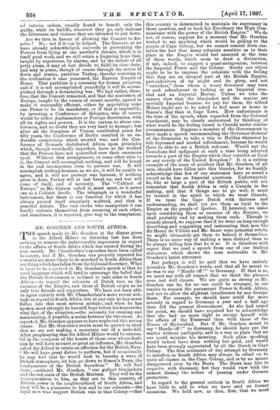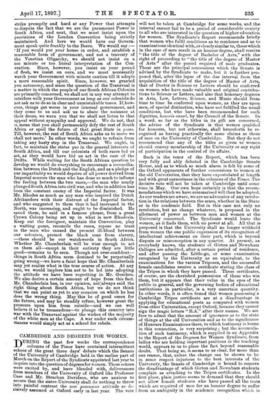MR. GOSCHEN AND SOUTH AFRICA. T HE speech made by Mr.
Goschen at the dinner given to Sir Alfred Milner on Saturday last has done nothing to remove the unfavourable impression in regard to the affairs of South Africa which has existed during the past month. Mr. Chamberlain's speeches have been called minatory, but if Mr. Goschen was properly reported his remarks are more likely to do mischief in South Africa than anything which has fallen from the Colonial Secretary. What is most to be regretted in Mr. Goschen's speech is that he used language which will tend to encourage the belief that the British Government is inclined to take sides in South Africa,—to regard the colonists of Dutch race as the enemies of the Empire, and those of British origin as its only true friends and supporters. We have not been able to agree entirely with Mr. Chamberlain's more recent atti- tude in regard to South Africa, but at any rate he has never fallen into this most serious mistake, and when he has spoken most strongly he has still kept before his hearers the vital fact of the situation,—the necessity for creating and maintaining, if possible, a union between the two races. As reported, Mr. Goschen appears to have neglected this saving clause. But Mr. Goschen's words must be quoted to show that we are not making a mountain out of a mole-hill. After prophesying that Sir Alfred Milner would be success- ful in the conquest of the hearts of those over whose desti- nies he will have to exert so great an influence, Mr. Goschen asked Sir Alfred to retain an affection for the British Navy.
He will have great duties to perform, but if occasionally he may feel that he would wish to breathe a wave of British atmosphere, let him go down to Simon's Town, the headquarters of the British Squadron." He will find there, continued Mr. Goschen, " our gallant bluejackets and the red coats of the British Marines. They will be the representatives to him, as they are to this country, of British power in the neighbourhood of South Africa, and they will be a guarantee to him and to our colonists—the loyal men who support British rule in that Colony—that this country is determined. to maintain its supremacy in these quarters, and to back his Excellency the High Com- missioner with the power of the British Empire." We do not, of course, suppose for a moment that Mr. Goschen wished to say any thing which would be galling to the people of Cape Colony, but we cannot conceal from our- selves the fact that many colonists sensitive as to their place in the Empire would feel annoyed at the tone of these words, which seem to draw a distinction, if not, indeed, to suggest a quasi-antagonism, between the Imperial Power and the Colony. Surely our object ought to be to impress the colonists with the feeling that they are an integral part of the British Empire, part-inheritors of its might and its glory, and not " outsiders," from whom a weary Governor may turn to seek refreshment in looking at an Imperial iron- clad and an Imperial Marine. Unless we take the narrow view that the bluejacket and the marine are specially Imperial because we pay for them, Sir Alfred Milner ought not to be asked to feel more at home in Simon's Bay than in Cape Town. How unfortunate is the tone of the speech, when regarded from the Colonial standpoint, may be clearly understood by thinking of what would be the feeling raised in Canada under similar circumstances. Suppose a member of the Government to have made a speech recommending the Governor-General of the Dominion to take a trip to Halifax whenever he felt depressed. and needed refreshment, because he would there be able to see a British red-coat. Would not the Canadians feel indignant at such a tone being adopted towards a part of the Empire which they consider as loyal as any county of the United Kingdom ? It is a curious example of the irony of accident that Mr. Goschen, of all men, should. have fallen into this blunder, for we frankly acknowledge that few of our statesmen have so sound. a record as he has on Imperial questions. Unfortunately he, like so large a part of the British public, will not remember that South Africa is only a Canada in the making, and that if things are to go well, it must be treated in the spirit in which we treat Canada. If we treat the Cape Dutch with fairness and understanding, we shall yet see them as loyal to the Empire as the people of Quebec. If, however, we insist upon considering them as enemies of the Empire, we shall probably end by making them such. Though it sounds absurd, we suppose that if we went on long enough describing and suggesting and insinuating that men like Sir Henry de Villiers and Mr. Sauer were potential rebels, we might ultimately get them to believe it themselves. There is no surer way of making a man disloyal than to be always telling him that he is so. It is therefore with regret that we read a speech from one of our leading statesmen which shows the tone noticeable in Mr. Goschen's latest utterance.
But perhaps it will be said that we have entirely mistaken Mr. Goschen's words, and that all he meant to do was to say " Hands off !" to Germany. If that is so, we must say with all respect that we think the phrases were not well chosen. We are quite as strong as Mr. Goschen can be, for no one could be stronger, in our resolve to remain the paramount Power in South Africa, and not to allow the slightest interference by any foreign State. For example, we should have acted far more severely in regard to Germany a year and a half ago than did the present Government. As she had raised the point, we should have required her to acknowledge that she had no more right to occupy herself with the affairs of the Transvaal than with those of the Nizam of Hyderabad. But if Mr. Goschen meant to say " Hands off ! " to Germany, he should have put the matter without ambiguity, and in a way so plain that no one could mistake his meaning. Such plain speaking would indeed have done nothing but good, and would have been strongly appreciated by all the Dutch in Cape Colony. The firm resistance of any attempt by Germany to interfere in South Africa may always be relied on to unite all classes in the Cape Colony, and is by no means disapproved even by the Boers. The Boers may like to coquette with Germany, but they would view with the utmost dismay the notion of passing under German protection.
In regard to the general outlook in South Africa we have little to add to what we have said on former occasions. We hold now. as then, first, that we must strike promptly and hard at any Power that attempts to dispute the fact that we are the paramount Power in South Africa, and next, that we must insist upon the provisions of the London Convention being strictly maintained. And here we would have our Govern- ment speak quite frankly to the Boers. We would say :- If you would put your house in order, and establish a reasonable form of government, and not a travesty of the Venetian Oligarchy, we should not insist on a too minute or too literal interpretation of the Con- vention. Since, however, you insist on your pound of flesh, we insist on ours, and we must necessarily watch your Government with minute caution till it adopts a more reasonable spirit. Since, however, we granted you autonomy, and since the question of the Transvaal is a matter in which the people of our South African Colonies are primarily concerned, we shall not in any way attempt to interfere with your Government as long as our colonists do not ask us to do so in clear and unmistakable tones. If, how- ever, things get worse in your internal government, and they come to us and ask us to abate the nuisance at their doors, we warn you that we shall not listen to that appeal without sympathy and approval. We do not, that is, mean that you shall permanently defy the rest of South Africa or spoil the future of that great State in posse. Till, however, the rest of South Africa asks us to move we shall not move.' In other words, we ought to refrain from taking any hasty step in the Transvaal. We ought, in fact, to maintain the status quo in the general interests of South Africa, and till our colonists of both races bid us act, as they would have bid us act in the case of the Drifts. While waiting for the South African question to develop we would do everything to encourage a reconcilia- tion between the Dutch and the English, and as a pledge of our impartiality we would deprive of all power derived from Imperial sources the man who has done so much to inflame the feeling between the two races,—the man who nearly plunged South Africa, into civil war, and who in addition has been the constant enemy of the Imperial factor. It was Mr. Rhodes as much as any man who inspired. the Dutch Afrikanders with their distrust of the Imperial factor, and who suggested to them that it had increased in the North, was increasing, and ought to be diminished. He saved them, he said in a famous phrase, from a great Crown Colony being set up in what is now Rhodesia. Keep out the foreigner, maintain the Convention, play a waiting game, reconcile the races, repose no trust in the man who caused the present ill-blood between our colonists, protect the black man from slavery, —these should be our watchwords in South Africa. Whether Mr. Chamberlain will be wise enough to act on them all—except in their entirety they are little good—remains to be seen. Though not over-confident- things in South Africa seem destined to be perpetually going wrong—we have a faint hope that Mr. Chamberlain may yet realise what is the true course of action. At any rate, we would implore him not to be led into adopting the attitude we have been regretting in Mr. Goschen. We also derive a. certain amount of hope from this fact. Mr. Chamberlain has, in our opinion, not:always said the right thing about South Africa, but we do not think that we can point as yet to any occasion on which he has done the wrong thing. May this be of good omen for the future, and may he steadily refuse, however great the pressure upon him from outside—and we can well believe it to be tremendous—to plunge this country into war with the Transvaal against the wishes of the majority of the white men at the Cape. A war under such circum- stances would simply act as a school for rebels.



































 Previous page
Previous page